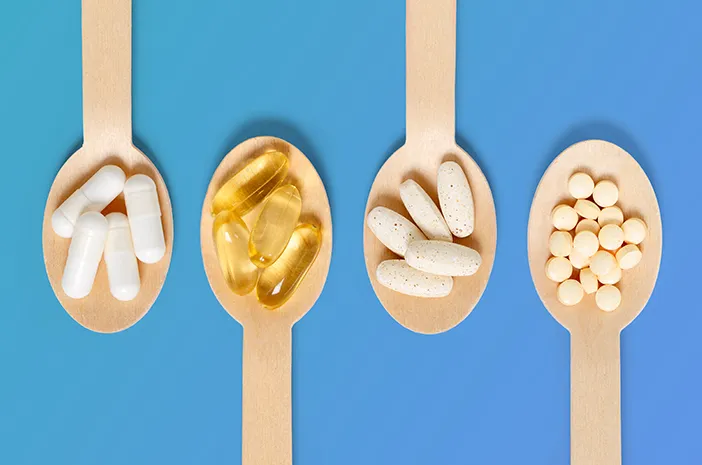Monday, 08 April 2024

Vitamin B is one of the essential nutrients needed by the body to support organ functions. There are eight types of B-complex vitamins, namely:
B1 (thiamine). B2 (riboflavin). B3 (niacin). B5 (pantothenic acid). B6 (pyridoxine). B7 (biotin). B9 (folate). B12 (cobalamin). Each type of vitamin B mentioned above has its own function for the body. Vitamins B1, B6, and B12, for example, belong to the category of neurotropic vitamins because they can support the function of the nervous system. B-complex vitamins play a role in the metabolism of carbohydrates, fats, and proteins.
Some B vitamins, such as biotin (vitamin B7) and niacin (vitamin B3), play a role in maintaining the health of the skin, hair, and nails. Vitamin B6, for example, is needed for the synthesis of serotonin and norepinephrine, neurotransmitters that regulate mood. And other benefits include maintaining heart health and boosting the immune system.
Benefits of Vitamin B by Type What are the benefits of vitamin B based on its type?
Because it belongs to the neurotropic vitamin group, vitamin B1 also helps maintain the function of the nervous system. You can obtain this vitamin from meat, seafood, and grains. Read more about other benefits in the article 6 Benefits of Vitamin B1 or Thiamine for the Body.
The intestines naturally produce riboflavin in small amounts. That's why you need to meet the need for vitamin B2 from other sources, such as food or supplements. Examples of foods rich in riboflavin are beef liver, chicken, and milk.
Vitamin B3 (Niacin) Niacin or vitamin B3 is well known for its benefits for maintaining skin health, improving enzyme benefits in the body, and helping the absorption of other types of vitamin B. The best sources of vitamin B3 can be obtained from beef, brown rice, and grains.
Vitamin B5 (Pantothenic Acid) Vitamin B5 helps in the production of hormones in the body. Other benefits include breaking down fats and converting carbohydrates into energy. Pantothenic acid can be obtained by consuming avocados, milk, nuts, and broccoli.
Vitamin B6 (Pyridoxine) Vitamin B6 or pyridoxine functions to overcome nausea. That is why this type of vitamin B is often prescribed by doctors in the first trimester of pregnancy. Pyridoxine also helps in insulin production and fighting infections.
In addition to supplementation, vitamin B6 is abundant in milk, nuts, bananas, chicken, and potatoes.
Vitamin B7 (Biotin) The type of vitamin often called biotin plays a major role in bone and hair health. Not only that, biotin also helps in the production of fatty acids. You can get this nutrient from egg yolks, cheese, sweet potatoes, meat, and offal, as well as nuts.
Vitamin B9 (Folate) Folate is one of the nutrients that pregnant women really need. Because this type of vitamin plays an important role in the formation of the baby's neural tube. A deficiency in this vitamin can cause neural tube defects that make babies have spinal cord and brain abnormalities.
Not only that, folate also helps in the formation of DNA cells. Vitamin B9 can be obtained from avocados, spinach, nuts, and cereals. In pregnant women, the need for folate increases significantly. That's why doctors often prescribe folate supplementation to ensure an adequate intake.
In addition to being able to affect fetal development, a deficiency in folate can also bring various health problems. The health of pregnant women certainly affects the health of the fetus in the womb.
Symptoms of Vitamin B Deficiency What happens if the body lacks vitamin B? The body can show symptoms as follows:
Fatigue. Weakness or lack of energy in general. Numbness or tingling in the hands and feet. Weak muscles and slow reflexes. Unsteady walking or difficulty maintaining balance. More severe symptoms include confusion, memory loss, depression, and dementia. Complete symptoms can be read in Beware, These are Signs of Vitamin B Deficiency.
Attention to the Use of Vitamin B Some things to consider before consuming vitamin B supplements are:
Inform your doctor if you are allergic to vitamin B or certain types of vitamin B. Consult your doctor if you have diabetes, liver problems, vitamin B12 deficiency (pernicious anemia). Inform your doctor if you have celiac disease, Crohn's disease, HIV, kidney disorders, rheumatoid arthritis, ulcerative colitis, inflammatory bowel disease, and alcohol use disorders. These conditions can inhibit the absorption of vitamin B. Chewable tablets or liquid forms may contain aspartame. Therefore, inform your doctor if you have phenylketonuria (PKU) or other conditions that require you to limit aspartame intake (or phenylalanine). Liquid form vitamins may also contain sugar or alcohol. Therefore, inform your doctor if you have diabetes, alcohol dependence, or liver disease if prescribed liquid vitamin B. Inform your doctor if you are pregnant so that the doctor can prescribe a rapid dose. These vitamins can be absorbed into breast milk, so you need to consult your doctor if you are breastfeeding. Vitamin B Dosage The dosage of vitamin B supplementation varies depending on the type of vitamin, age, gender, and health condition. According to the U.S. National Institutes of Health (NIH), the vitamin B requirements for men and women are: